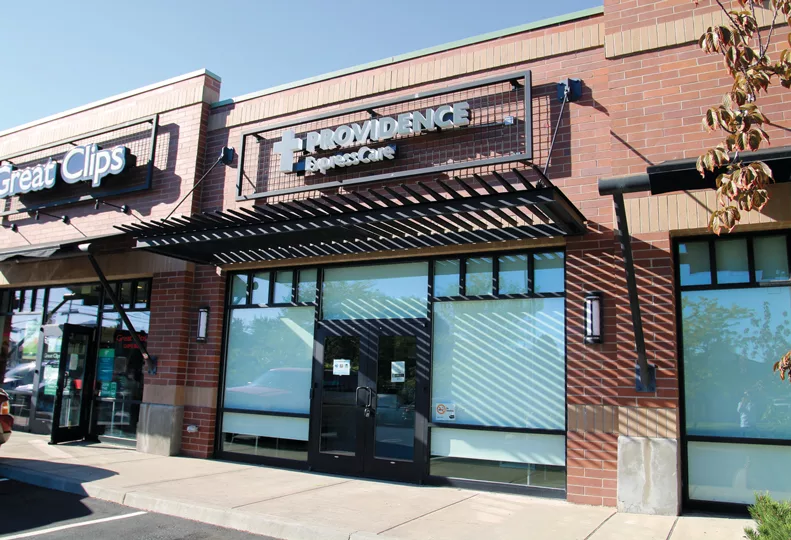
Home » Retail health care expands in Spokane
Retail health care expands in Spokane
Virtual care services also see exponential growth

September 10, 2020
Retail health care is a growing trend in the Spokane region, with at least 16 care clinics dedicated to providing consumer-driven care to patients popping up all over the county over the past few years.
Most recently, virtual health care has been blooming on the retail health care scene, says David McAughan, Seattle-based chief operating officer of Providence ExpressCare.
In addition to its ExpressCare and ExpressCare Virtual offerings, Renton, Washington-based Providence Health & Services holdings here include Providence Sacred Heart, Sacred Heart Children’s, and Holy Family hospitals.
ExpressCare is Providence Health & Services’ retail clinic offering. Its services include same-day appointments seven days a week and integration with Providence’s primary care.
The service was established roughly four years ago, says McAughan. Since then, Providence has established six ExpressCare clinics in the Spokane area, two of which are embedded in Walgreens stores.
“The model really was created for three reasons,” says McAughan. “First and foremost, to create better access to care. If you’re a new patient in the Spokane market and you want to get access to a primary care doctor, it can be very challenging.”
Providence created ExpressCare to meet that need, McAughan contends.
Since ExpressCare is integrated with the Providence network, patients who are seen virtually or at an ExpressCare clinic have access to the full spectrum of services available through Providence, McAughan says. If there is a need for further testing or lab work, an ExpressCare patient can be referred to another provider within the system, he explains.
The second reason for creating the model was to improve the user experience, he says.
“We realized that health care overall is not necessarily one of people’s favorite activities,” McAughan says. “It’s not convenient. They don’t have great access. So, they have a tendency to neglect their health care.”
To address experience, Providence ExpressCare is digitally oriented, he says. Patients can schedule online, and the clinic is open seven days a week, 12 hours a day.
“The objective is to take this network and really allow us to stand further in the communities,” says McAughan “It allows us to be a little more nimble.”
Finally, McAughan says the model is based on a “retail-friendly concept,” meaning clinics are designed to be more open, with brighter colors and layouts that create less of a divide between the staff and patients.
Although virtual health care has been available to Providence patients for nine years, Providence ExpressCare has experienced a boom in demand for virtual services in recent months, McAughan says.
“What we’ve noticed over the last six months, since the pandemic struck, is a real appetite to be seen virtually,” he says.
Over that time frame, Providence ExpressCare has seen tens of thousands of patients across the multistate network virtually, he adds.
Amanda Ashley, the Portland, Oregon-based director of digital experience of ExpressCare, adds that virtual use has increased 900% year-over-year.
“As payers become more accepting of telemedicine, video visits, or chat-based visits, and as we’re seeing regulations loosen … I do think we’re going to see this growth that we’ve seen through COVID continue,” Ashley adds.
That said, McAughan says ExpressCare makes up a modest portion of the overall Providence health care system.
ExpressCare has 65 clinics along the West Coast and is on track to see between 300,000 to 350,000 patients this year, he says. Based on the current growth trajectory, he estimates the clinics could see upwards of 500,000 patients a year over the next couple of years.
Tacoma-based MultiCare Health System operates MultiCare Indigo Urgent Care Clinics as retail options here in addition to its other Spokane-area holdings, which include Deaconess and Valley hospitals and Rockwood Clinics. MultiCare has established five such retail clinics in Spokane County, and will open its 30th location this year, says Ryan Fix, president of retail health at MultiCare.
He adds that the organization is in the process of opening a Liberty Lake location this fall, and an Airway Heights location this spring.
MultiCare opened its first Indigo in 2016.
“I’d say growth was measured initially,” says Fix, “in part because this concept was so different for health care. What we’re seeing now is more rapid growth in 2021 and beyond.”
The retail trend isn’t limited to the major health care systems like Providence and MultiCare Health System. Other health care-oriented industries, including health insurance systems, are jumping aboard.
Premera Blue Cross, a health insurance provider based in Mountlake Terrace, Washington, has established two retail health clinics in the Spokane region over the past year, and is constructing a third in Spokane Valley.
The organization’s clinics, which operate under the name Vivacity Care Center, are focused on the same principals of retail health care - convenience, ease of access, and patient experience.
Vivacity, a physician-owned practice, also serves LifeWise Health Plan of Washington, and BlueCard members.
The retail trend also has expanded here to other health care services, such as physical therapy, dentistry, and ophthalmology.
Dr. Joshua Cochran, owner of Dr. C’s Family Dentistry in Spokane Valley, recently told the Journal that he’s developing a 16,000-square-foot dental and retail structure in Airway Heights that will serve as a new location for the dental practice.
At the time, Cochran said the drive to open the new clinic, which will be located at 11919 W. Sunset Highway, could be attributed to the medical to retail shift, with providers focusing more on convenience and accessibility.
In addition to that, he says the facility is planned to be a sort of “one-stop shop” for patients with busy schedules, and hopes to lease the additional retail spaces to other health care providers, such as an optometrist, a physical therapist, or a chiropractor.
According to a study by Accenture, a Dublin, Ireland-based research company, 47% of U.S. patients used walk-in or retail clinics, while 29% used some form of virtual care in 2018.
Accenture estimates there were 2,800 medical clinics in retail spaces in 2017, a significant increase from 351 in 2006. According to a report from Chicago-based commercial real estate and financial services company Jones Lang LaSalle Inc., the number of health clinics in retail spaces could almost double by 2022.
Looking forward, the retail trend only is expected to grow. A study by Gensler, a San Francisco-based design and architecture firm, shows consumer demand for retail health clinics is expected to drive 25% to 30% growth annually. In 2020, projected alternative care site revenue is estimated to be $40 billion.
McAughan contends, however, there always will be a need for traditional health care providers, an idea Fix agrees with.
“Health care is changing, there’s a lot we don’t know about what it’s going to change to,” McAughan says. “I do think convenience and improved experience is going to be demanded of health care in whatever format that might reside.”
Fix adds, “I think retail health is clearly the future. Amazon and Wal-Mart are just a couple of the retail powerhouses who are entering this space, so that says a lot.”
Latest News Special Report Health Care Retail
Related Articles
Related Products




